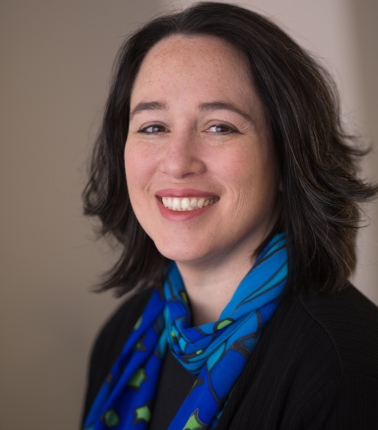
Departmental Affiliations
Center & Institute Affiliations
Roni Neff, PhD '06, ScM, researches ways to cut food waste and address climate change through more resilient, equitable, and healthy food systems.
Contact Info
Research Interests
Food system; food waste; resilience; food rescue; equity; food donation; climate change; sustainability; workers; food insecurity; policy
Additional Links
Experiences & Accomplishments
My research, policy and practice activities focus on advancing change at the intersection of food systems, planetary health and social justice.
Wasted food: For nearly a decade, I have explored wasted food causes and solutions, while seeking to broaden discourse on the issue to avoid suggesting food waste as a solution to hunger and the reverse. I am co-PI of the NSF-supported RECIPES food waste research network, through which my team and I focus on the quality of food provided through food rescue, co-creating worker-led interventions, evaluating food waste solutions in schools and local governments, and policy analysis. I am also PI of a USDA-supported INFEWS (food-energy-water nexus) study examining waste and resource use across the US seafood supply chain. I also participate in research focused on food rescue and public education. I recently served on a National Academy of Sciences consensus panel recommending a systems approach to consumer food waste.
Food system resilience: I work to support food security in the face of natural and human-made disasters by researching and promoting community planning. In late 2022 my team released a planning guide for local governments, the product of a multi-year collaboration with 5 US cities. The work builds on our 2017 Baltimore City collaboration that produced one of the first municipal food system resilience planning documents in the US. I also served on the executive team for the National Food Access and COVID Research Team (NFACT), and am performing analyses to better understand determinants of food system resilience.
Food insecurity & occupational health/safety: I am partnering with NIOSH on a project to address food insecurity as a social determinant of occupational injury/illness.
I engage with public health practice and with broader food system issues through my longtime role at the school's Center for a Livable Future, an academic center focused on food systems & public health. I lead the CLF’s Food and Climate Team. I teach the community-engaged seminar course, Baltimore Food Systems: A Case Study in Urban Food Environments and an online course, Food System Resilience to Disasters. I co-lead the department’s PhD track in Environmental Sustainability, Resilience and Health, and co-direct the school's MPH Concentration and Certificate programs in Food Systems & Public Health. I edited the widely-used textbook, Introduction to the US Food System: Public Health, Environment, Equity (Wiley-Jossey Bass, 2014). I am a member of the National Academy of Sciences Food Forum. My work has been featured in major media outlets in the US and internationally.
Honors & Awards
Excellence in teaching, Johns Hopkins Bloomberg School of Public Health, 2010 - 2023
Delta Omega Award for Innovative Public Health Curriculum – Second Place, for Food System Certificate (co-leader of certificate), 2017
Faculty Excellence in Service Learning Award, SOURCE, JHSPH 2014
Champion of the Month, May 2014, SOURCE, JHSPH
SOURCE Service Learning Faculty Fellow, 2012-13
Delta Omega Public Health Honor Society, Alpha Chapter, 2007
Victor P. Raymond Award in Health Policy, 2003
Select Publications
Below are some of my most recent publications.
Moore E, Biehl E, Burke M, Misiaszek C, Bassarab K, Neff RA. 2022. Food System Resilience: A Planning Guide for Local Governments. Johns Hopkins Center for a Livable Future. 6 chapters. https://clf.jhsph.edu/projects/food-system-resilience/resilience-planning-guide
Neff RA, Ramsing R, Kim B. 2023. Commercial weight-loss diets may greatly exceed sustainable targets for greenhouse gas emissions and freshwater consumption. Journal of Human Nutrition and Dietetics. In press.
Love D, Asche F, Fry J, Nguyen L, Gephart J, Garlock T, Jenkins L, Anderson J, Brown M, Viglia S, Nussbaumer E, Neff RA. Aquatic food loss and waste rate in the United States is half of earlier estimates. Nature Food. In press.
Lara-Arévalo J, Escobar-Burgos L, Moore E, Neff RA, Spiker M. 2023. COVID-19, Climate Change, and Conflict in Honduras: A food system disruption analysis. Global Food Security. https://doi.org/10.1016/j.gfs.2023.100693
Ceryes C, Rittenberg CG, Edwards D, Khan S, Heley K, Seifu L, Neff RA. Farmer incentives for crop donation: A qualitative study. 2023. Journal of Agriculture, Food Systems & Community Development. 12(4), 1–18. https://doi.org/10.5304/jafscd.2023.124.002
Ceryes CA, Agnew J, Wirtz AL, Barnett DJ, Neff RA. 2023. Exploring U.S. food system workers’ intentions to work while ill during the early COVID-19 pandemic: a national survey. Int J Environ Res Public Health. https://doi.org/10.3390/ijerph20021638
Clay LA, Koyratty N, Rogus S, Colon-Ramos U, Hossan A, Josephson A, Neff R, Zack RM, Niles MT. 2023. A mixed methods approach to the development of a disaster food security framework. Journal of the Academy of Nutrition and Dietetics. 123:10. S46-58. https://doi-org.proxy1.library.jhu.edu/10.1016/j.jand.2023.05.005
